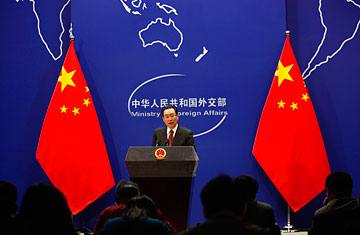
Wu Dawei, China's special representative on Korean affairs, speaks during a news conference in Beijing on Nov. 28, 2010
The message from the Chinese Foreign Ministry spoke of "important announcements." The news, delivered at a rare Sunday press conference, was that China was calling for emergency consultations between itself, North and South Korea, the U.S., Japan and Russia. For a region deeply unsettled by the North's deadly artillery strike on a South Korean island last week, it was a welcome call for calm by the North's key ally.
The announcement capped a weekend of diplomacy by China, which had previously said little about the attack that killed four South Koreans on Nov. 23. The day after the North's assault, a Foreign Ministry spokesman noted that China hoped "the relevant parties will do more to contribute to peace and stability in the region." But tensions escalated as the week went on, and it became clear that equivocating calls for calm would not be enough. The U.S. and South Korea announced that they would hold naval drills with an aircraft carrier, the U.S.S. George Washington, in waters west of the Korean peninsula. That clearly rattled Beijing, which believes its 200-mile (322 km) exclusive economic zone in the Yellow Sea should be off-limits to U.S. Navy vessels.
On Saturday, State Councilor Dai Bingguo, China's top foreign policy official, flew to Seoul to pitch new talks to South Korean President Lee Myung Bak. The next day, Wu Dawei, Beijing's special representative on Korean affairs, was careful in his two-minute statement to point out that the proposed consultations would not be a resumption of the six-party talks, the on-again, off-again negotiations between those same regional players that have tried — so far unsuccessfully — to persuade North Korea to give up its nuclear weapons programs. Still, Wu said China hoped that the proposed meeting between the parties "will help create conditions for the relaunch of the six-party talks."
As of Monday evening, however, there was no indication that South Korea, Japan or the U.S. will agree to meet with North Korea. The fear on the part of the U.S. and its allies is that agreeing to talks so soon after the attack would be seen as rewarding the North's aggression. The U.S. is now consulting with South Korea, Japan and "other partners," says Nicholas J.C. Snyder, a spokesman for the U.S. embassy in Beijing. "The six-party talks cannot substitute for action by North Korea to comply with its obligations. North Korea's provocative behavior is destabilizing," he says, adding that "clear steps by North Korea are needed to demonstrate a change of behavior."
Analysts held out little hope that China's proposed consultations could produce results. Beijing's pitch is "irrelevant," says Andrei Lankov, a North Korean expert at Kookmin University in Seoul. "I'm not sure if it would be accepted by the other parties. I think it should be accepted, because talks are already better than not talking and can help ease tension somewhat. But it's not going to be a solution."
The six-party talks were launched in 2003 after North Korea acknowledged that it had a program to enrich uranium for nuclear weapons and pulled out of the Nuclear Non-Proliferation Treaty. The talks stalled after the March 2010 sinking of the Cheonan, a South Korean navy vessel, which killed 46 sailors. An international investigation blamed the sinking on a North Korean torpedo. North Korea denies the attack, and China has so far declined to assign responsibility.
After Dai's visit to Seoul over the weekend, President Lee indicated that the timing wasn't right for a resumption of the six-party talks, but Beijing, as the talks' chief sponsor, said it hoped the emergency consultations will remove those doubts and that the seven-year-old process can continue. "They want the six-party talks to survive," says Lankov. "They want the show to go on because they are the producer of the show." By calling for talks even before the major players agreed, Beijing indicated that it wants credit for its initiative. "You would hope that an announcement like that would be choreographed in some way," says John Delury, an assistant professor at Yonsei University's Graduate School of International Studies in Seoul.
Even if the talks don't move forward, the act of proposing them takes some of the heat off China from the U.S. and its allies for not responding sooner and more decisively to last week's attack. "Calling for talks is a good way to appear to be playing a responsible role," says Stephanie Kleine-Ahlbrandt, the North East Asia project director for International Crisis Group, a Brussels-based think tank. "It's also a way to decrease pressure on China to push North Korea or openly criticize its actions." Though Beijing was angered by North Korea's nuclear tests in 2006 and 2009, it ultimately fears a collapse of the regime, which could cause refugees to stream into northern China and lead to the placement of U.S. forces along its border.
The U.S. diplomatic cables released on Monday by WikiLeaks give some hints of how the U.S. and China foresee future developments on the Korean peninsula. One cable from the U.S. embassy in Beijing quoted Dai as saying in 2009 that "the lever of economic development" in North Korea hadn't been used effectively in the six-party talks. The New York Times reported that South Korea suggested that the right business deals might ease China's "concerns about living with a reunified Korea" in "benign alliance" with the U.S.
For now, the shelling of South Korea's Yeonpyeong Island, which sits in disputed waters west of Seoul, has given the U.S. cause for further military involvement, which Beijing wants to avoid. If the talks go ahead, Beijing will be seen as the moderating voice that pulled the region back from the brink of war. If they fail, it will get credit for trying. Either way, it's not a bad result for a weekend's work.
